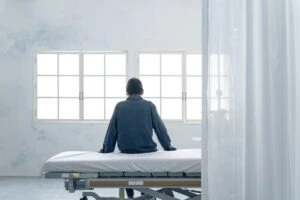
Three consequences of a 5150 include the two potential subsequent holds—5250 and 5260—as well as the loss of your right to own or possess a firearm for a length of time. California’s Welfare & Institutions Code § 5150 refers to an involuntary psychiatric hold in a facility. This hold can apply if authorities deem a person at risk of harming others or themselves.
A Los Angeles 5150 holds lawyer can advocate for your rights during and after your hold. You have the right to consult an attorney during an involuntary hold, though your communication will be subject to the facility’s visitor and phone call restrictions and guidelines.
Your Rights Under a 5150 Hold
California’s Welfare & Institutions Code § 5150 allows for the involuntary hospitalization of a person, usually escorted by the police, for 72 hours in a psychiatric facility. This law applies to anyone who is deemed at risk of hurting themselves or someone else. During the 72-hour hold, a person will receive psychiatric evaluation and treatment, even if they do not consent to it.
Treatment can include psychiatric medication, counseling, and assessment. While you generally cannot refuse a 5150 hold, you have certain rights during the process. For example, you have the right to know the reason you are being detained, access to proper medical care, and the opportunity to communicate with loved ones and a lawyer.
For a free legal consultation, call (310) 896-2723
A 5150 Hold Can Potentially Lead to More Severe Holds
What happens after a 5150 hold in California depends on the results of your psychiatric assessment. After an initial 5150 involuntary psychiatric hold in California, there are two potential subsequent holds that can extend the involuntary treatment.
5250 Hold
If the individual is still deemed a danger to themselves or others after the 72-hour 5150 hold, they may be placed on a 5250 hold. This allows for up to 14 additional days of involuntary intensive treatment and evaluation.
During this period, psychiatric staff will continue treatment efforts while developing a more comprehensive plan to address the person’s mental health needs. The goal is stabilization to where they no longer require an involuntary hold.
5260 Hold
However, if the individual still meets the criteria for being a danger after the 14-day 5250 hold, they can be placed on a 5260 hold for long-term involuntary treatment up to one full year.
This extended 5260 hold is renewed periodically but can continue involuntary commitment for up to one year total if the person’s condition doesn’t improve enough for safe release. Doctors will provide ongoing psychiatric treatment during this time while regularly evaluating whether the strict criteria for involuntary commitment are still met.
Your Rights to Context 5250 and 5260 Holds
For both the 5250 and 5260 holds, the individual retains the right to contest the hold and have their continual involuntary status reviewed by mental health officials and the court system. The primary goal is providing stabilizing treatment, but with safeguards in place to prevent unnecessary deprivation of liberties.
Outpatient treatment and follow-up care are also commonly required upon release to support and monitor the individual’s transition back to normal life while managing their mental health condition.
Another Consequence of a 5150: The Loss of Your Rights to Own a Firearm
Under California’s Welfare & Institutions Code, individuals placed on an involuntary 5150 psychiatric hold face significant consequences regarding firearm ownership and possession. Specifically:
- Five-Year Firearms Ban (§8103(f)(1)): After a 5150 hold, the individual cannot possess or own any firearm or deadly weapon for five years following release.
- Lifetime Ban for Second Hold (§8103(f)(1)): If the person undergoes another 5150 hold within one year of the first, the firearms ban becomes permanent and lifelong.
- Right to Hearing (§8103(f)(3)): The affected individual can request a hearing to challenge the firearms prohibition within five years of the initial ban being imposed.
These strict provisions under California’s mental health laws aim to prevent potential violence by restricting access to firearms for those deemed a danger due to mental health issues.
However, the right to a hearing allows an opportunity to contest the ban if the individual’s circumstances change and fears are alleviated over time. Navigating these complex statutes is best done with legal counsel to protect one’s rights and interests.
Call Simmrin Law Group to Learn More About the Three Consequences of a 5150 Hold
If you or a loved one is facing an involuntary 5150 psychiatric hold in Los Angeles, the Simmrin Law Group can help. Our 5150 holds attorneys will fight to protect your rights, challenge unjustified holds, and ensure proper procedures are followed every step of the way.
We understand the emotional toll these situations take and will guide you through it with compassionate support. Don’t navigate California’s complex mental health laws alone — contact us now. Our team is ready to advocate tirelessly on your behalf during this difficult time.
Call or text (310) 896-2723 or complete a Free Case Evaluation form
